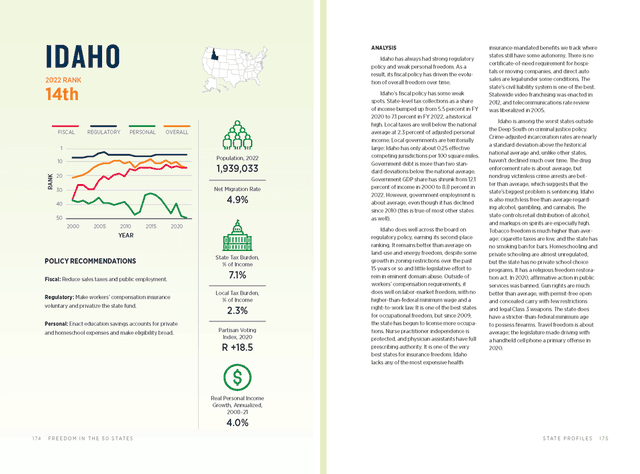Analysis
Idaho has always had strong regulatory policy and weak personal freedom. As a result, its fiscal policy has driven the evolution of overall freedom over time.
Idaho’s fiscal policy has some weak spots. State-level tax collections as a share of income bumped up from 5.5 percent in FY 2020 to 7.1 percent in FY 2022, a historical high. Local taxes are well below the national average at 2.3 percent of adjusted personal income. Local governments are territorially large: Idaho has only about 0.25 effective competing jurisdictions per 100 square miles. Government debt is more than two standard deviations below the national average. Government GDP share has shrunk from 12.1 percent of income in 2000 to 8.8 percent in 2022. However, government employment is about average, even though it has declined since 2010 (this is true of most other states as well).
Idaho does well across the board on regulatory policy, earning its second-place ranking. It remains better than average on land-use and energy freedom, despite some growth in zoning restrictions over the past 15 years or so and little legislative effort to rein in eminent domain abuse. Outside of workers’ compensation requirements, it does well on labor-market freedom, with no higher-than-federal minimum wage and a right-to-work law. It is one of the best states for occupational freedom, but since 2009, the state has begun to license more occupations. Nurse practitioner independence is protected, and physician assistants have full prescribing authority. It is one of the very best states for insurance freedom. Idaho lacks any of the most expensive health insurance-mandated benefits we track where states still have some autonomy. There is no certificate-of-need requirement for hospitals or moving companies, and direct auto sales are legal under some conditions. The state’s civil liability system is one of the best. Statewide video franchising was enacted in 2012, and telecommunications rate review was liberalized in 2005.
Idaho is among the worst states outside the Deep South on criminal justice policy. Crime-adjusted incarceration rates are nearly a standard deviation above the historical national average and, unlike other states, haven’t declined much over time. The drug enforcement rate is about average, but nondrug victimless crime arrests are better than average, which suggests that the state’s biggest problem is sentencing. Idaho is also much less free than average regarding alcohol, gambling, and cannabis. The state controls retail distribution of alcohol, and markups on spirits are especially high. Tobacco freedom is much higher than average: cigarette taxes are low, and the state has no smoking ban for bars. Homeschooling and private schooling are almost unregulated, but the state has no private school choice programs. It has a religious freedom restoration act. In 2020, affirmative action in public services was banned. Gun rights are much better than average, with permit-free open and concealed carry with few restrictions and legal Class 3 weapons. The state does have a stricter-than-federal minimum age to possess firearms. Travel freedom is about average; the legislature made driving with a handheld cell phone a primary offense in 2020.

